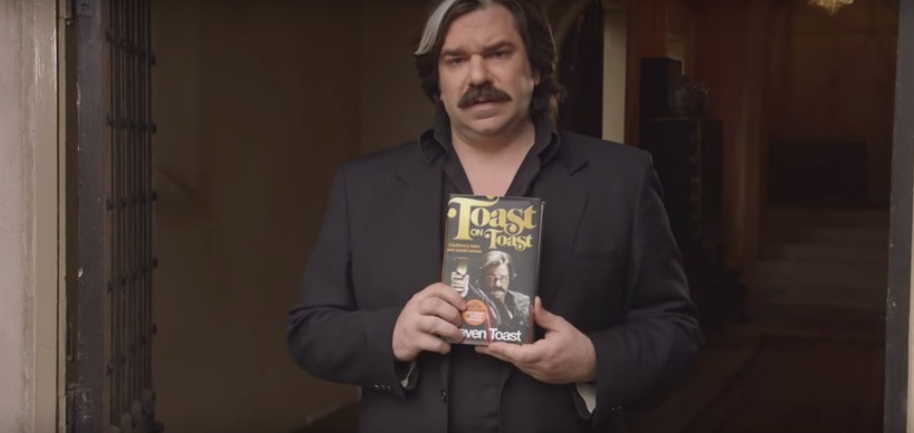Steven Toast rips into the modern BBC
Promoted Post: In this exclusive extract from his forthcoming memoir-slash-acting guide ‘Toast on Toast’, the owner of the most memorable quiff-and-tache combination in showbiz passes judgement on the modern BBC.
“When somebody is old enough, as I am, to remember truly great programmes like The World at War, The Forsyte Saga, Jonathan Miller’s marvellous version of Alice in Wonderland, and the BBC’s wonderful coverage of the Grand National, it is really heart-breaking to see them replaced by shows like Fuck You, I’m Ginger, Strictly Come Dancing and Shit Storm. It is a truly dark passage that the BBC has entered and seemingly is unable to find a way out of.
Superb broadcasters such as Robin Day, Richard Dimbleby, Kenneth Clark and Barry Norman have been replaced by arseholes such as Russell Brand (until he got sacked), Dan Snow, Jeremy Clarkson (until he got sacked) and Vanessa Feltz. Is this a move in the right direction? I think not. The BBC has some serious decisions to make over the next few years, and the role of funding will be crucial.
In a digital age, should our national public broadcaster still be propped up by money raised from a compulsory licence fee? Only an idiot or someone who has lived on Mars for the last twenty years would say that the licence fee gives real value for money. (Injecting heroin into your eyeball would be a lot more fun and would cost a lot less.) Making the licence fee compulsory is, and always has been, in my view, a grave mistake. It breeds complacency, arrogance and a ‘fuck you’ mentality which permeates the BBC at every level.
A staggering 98 per cent of this licence fee goes to paying the salaries of just three of its ‘stars’, and this just does not seem right to me. In 2014, the new BBC offices at Salford spent two billion pounds on ‘ethnic-friendly’ staples. Is this a good use of public money? Absolutely not. So what should we have instead? I suggest a voluntary licence fee of twenty thousand pounds per annum. When I have floated this idea before to some broadcasters I know they have expressed cynicism. Of course not everybody is voluntarily going to pay twenty thousand pounds when they can receive the exact same service for nothing. But some people might. And it also might . . . just might . . . improve the quality of the programmes themselves. Isn’t it a risk worth taking? The alternative is to be bombarded every night of our lives with shit television programmes.”
Toast on Toast is published on October 22nd by Canongate

